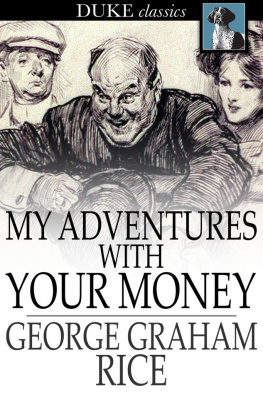Contents
Guide

The author and publisher have provided this e-book to you for your personal use only. You may not make this e-book publicly available in any way. Copyright infringement is against the law. If you believe the copy of this e-book you are reading infringes on the authors copyright, please notify the publisher at:
us.macmillanusa.com/piracy.
To The American Damphool Speculator, surnamed the American Sucker, otherwise described herein as The Thinker Who Thinks He Knows But Doesntgreetings! This book is for you! Read as you run, and may you run as you read.
G. G. R., NEW YORK, MARCH 15, 1913
( G EORGE G RAHAM R ICES ORIGINAL INTRODUCTION
TO HIS 1913 AUTOBIOGRAPHY , M Y A DVENTURES
WITH Y OUR M ONEY )
After six months of shifting and grifting between crooked card games, poolrooms, and horse tracks without a real job, George Graham Rice crisply aligned the brim of his derby with the top of his smart-looking spectacles and edged into the seven-story shadow of the Metropolitan Opera House, calmly but keenly observing New Yorks urban blur from the yellow-bricked street corner of Fortieth and Broadway. Maintaining a countenance of congeniality, Rice shrewdly scanned the slushy chaos of foot, trolley, and carriage traffic, sizing up faces with a feral inner cunning his thirty years had honed to a sharp tool of self-preservation. Because the $7.30 tucked tightly into the pants pocket of his one good suit represented Rices entire net worth on this first Tuesday of March 1901, George was instinctivelybut with casual, cultured dignityon the hustle for marks who looked ripe to be suckered.
Amid the swirl of strangers, Rice recognized an old racetrack chum. Although George was a man of many acquaintances, he steered clear of true friendships based on mutual trust. Rice could play the part of a witty, charming ringleader when he chose, but he valued his charismatic personality more as an asset that afforded him an edge in social manipulation.
As the man from the track approached, George clicked into intuitive overdrive, calculating the costs and benefits of extended conversation. Without missing a beat, Rice beamed a phosphorescent smile and reached out to heartily shake Dave Campbells outstretched hand, even though he knew in his gut the gents too-robust greeting belied the desperation of a struggling soul down on his luck.
Buy me a drink? Campbell rasped as soon as pleasantries were out of the way.
Rice didnt consider Campbell a sucker hed fleece. But he was willing to speculate on the chance that Dave might be harboring some nugget of useful information worth extracting.
George wasnt much of a drinkerthe occasional silver gin fizz or flute of fine champagnebut he did have a weakness for good cigars. At a caf table, Rice lit up a twenty-five-cent perfecto and set up Dave with a nickel beer. Over by the lunch counter, a regulation news ticker chattered away, spitting out a continuous tape of stock quotes and racetrack results.
Still bet on the horses? Campbell asked.
No, Rice replied, exhaling a plume. His unflinching blue eyes squarely met Daves. Havent had a bet down in more than a year.
This was an outright lie. Yet the man telling it possessed a most persuasive way of making even the most outlandish distortions of reality seem wholly convincing and plausible.
Although it was technically true there had been recent periods when George did not set foot in any gambling establishment, thats only because those abstentions coincided with stints behind bars for stealing. For two and a half years at Elmira Reformatory, Rice was known as inmate No. 4018. Serving a six-and-a-half-year forgery sentence at Sing Sing, George was prisoner B-516. Prior to incarceration, he had abandoned his birth name, Jacob Simon Herzig, in favor of multiple aliases, trying out and discarding namesAbram Herzog, Joseph Hart, Jack Hornadayas they suited his convenience. Rices current nom de plumeliberated from a deceased reform school inmatehad been his preferred moniker since he first tried to use it to win a short story contest. Around the gritty Tenderloin district, they knew him as GG. In racetrack betting rings, bookies dubbed him Ricecakes. His first wife called him Jock. His second bride probably had a nickname for him too, although Rice took great pains to ensure neither spouse became aware of the others existence.
As the twentieth century opened, Rice had not yet settled into the nebulously mysterious role of con artist. But he had tried it out, just like the various aliases, and would have bristled at the notion that anyone considered him a thief because of the series ofas he preferred to term themyouthful indiscretions that landed him in jail. George cultivated a literary style while incarcerated, reading voraciously, improving his manners, and earning early release. Now, back on the street, he could pass for a college graduate. Except his education took the form of the dark, nuanced art of swindling.
After Sing Sing, Rice hooked on as a newspaperman with the New Orleans Times-Democrat . He happened to be in Galveston, Texas, on September 8, 1900, in the hurricane eye of Americas most deadly natural disaster. His firsthand stories of carnage and courage made headlines nationwide, but conflicting accounts arose over whether Rices writing was more fiction than fact: One self-styled tale had George stealing a horse to escape the flood before heroically meeting a supply train to lead the relief expedition. A separate version asserted he was run out of town by colleagues for selling stories to rival papers and double billing expenses. Yet another contended the military ordered Rice out of Texas for spreading false panic. Now, back in New York, the only certainty about George was that whatever sensational tale he spun, it was bound to be brimming with the allure of tantalizing possibility. He didnt care that he was broke and jobless; Galveston had sparked a brainstorm about the sensational selling power of a well-crafted story.
Campbell was cagey enough to know you didnt get something for nothing from GG, not even a five-cent mug of suds. He followed his opening gambit about the racetrack by producing correspondence from a notorious horse hustler, the only item of value Dave had in his possession.
Heres a letter I just received from Frank Mead at New Orleans, Campbell said, sliding a folded slip across the table. It ought to make you some money.
Mead wrote a racing column for the New Orleans States-Item under the pen name Foxy Grandpa and recorded bets as a sheet writer for a Crescent City bookmaking firm known as the Big Store. He also moonlighted as a night-shift croupier at a clandestine casino, and his unique combination of quasi-legal gambling gigs meant Mead frequently brushed up against inside information in horse racings premier winter betting market. The letter told Campbell to keep an eye out for a precocious colt named Silver Coin: Held back by his jockey the last few races to make the fast horse appear talentless, Silver Coin would be unleashed to run to his true potential next time out. Those in the know would bet big, presumably burning bookies at odds as high as ten to one.
Rice was quick to compute how to best leverage this edge. If he bet his last $7, it would net him $70 if Silver Coin won at ten to onea decent return, but not the huge, breakthrough score GG was gunning for. If he was going to risk every last cent in his pocket, George wanted a gamble that paid off in life-altering terms.











